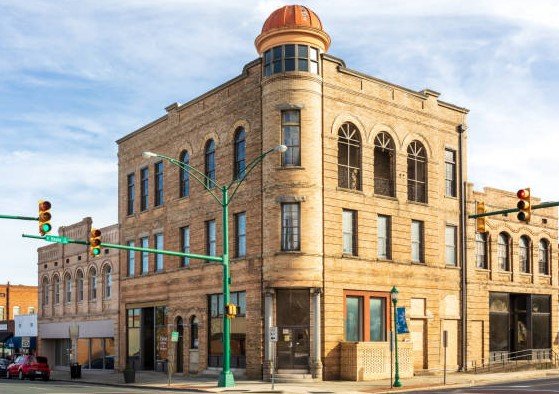A quiet provision in Washington’s new tax bill is stirring hope among small-town lenders who’ve spent years watching their kind disappear.
The estate tax exemption hike in the One Big Beautiful Bill Act (OBBBA) might not sound glamorous, but for family-owned community banks — the kind that sponsor local football teams and know everyone’s first name — it could mean the difference between staying independent or getting swallowed by a giant.
The Vanishing Face of Rural Banking
Across America’s small towns, the familiar corner banks that once defined Main Street are vanishing. In 1995, there were nearly 10,000 financial institutions. Today, fewer than half remain. The slide has been steep — and painful.
Chris Gosnell, CEO of Farmers Bank & Trust of Magnolia in Arkansas, says he’s watched peers shutter or sell out under mounting pressure. “How do we get younger people into the industry and how are we recruiting that talent and retaining it once we have it?” he asked recently. His question, though meant for workforce issues, also echoes the broader anxiety of an industry aging out.

Community banks now hold just 11% of all U.S. bank assets, yet they punch far above their weight: 37% of small-business loans and nearly two-thirds of all farm loans come from them.
One banker in Iowa put it more bluntly: “When the big guys sneeze, we catch pneumonia.”
Why Estate Taxes Became a Breaking Point
For years, estate taxes have loomed like a thundercloud over small lenders. Many of these banks aren’t owned by hedge funds or public investors but by families — sometimes the same ones who opened their doors a century ago.
Here’s the problem: When a founder or majority owner dies, the estate tax kicks in. Without enough liquid assets to pay the tax bill, heirs can be forced to sell part — or all — of the bank.
Under the 2017 Tax Cuts & Jobs Act, the estate tax threshold rose to $11.18 million per person, adjusted for inflation. In 2025, it sits at roughly $13.99 million. But the law was set to expire in 2026, dropping the exemption to about $6.5 million.
That would’ve been devastating for small-town banks, says Brandon Milhorn, president and CEO of the Conference of State Bank Supervisors. “We’re not talking about billion-dollar institutions here. These are family-run banks that serve farmers, small businesses, and first-time homebuyers.”
What the New Bill Actually Does
The OBBBA, passed earlier this year, permanently raises the estate tax exemption to $15 million per individual, indexed to inflation. The move offers breathing room for local bankers who feared generational handovers could trigger forced sales.
According to data shared by the Independent Community Bankers of America (ICBA), more than 60% of community banks are family-controlled. Without relief, hundreds could have faced liquidation within a decade.
To put it in perspective:
| Year | Estate Tax Exemption (Individual) | Estimated Community Banks at Risk |
|---|---|---|
| 2014 | $5.34 million | 6,100 |
| 2025 (Before OBBBA) | ~$6.5 million (projected) | 4,050 |
| 2025 (After OBBBA) | $15 million | <3,000 (stabilized projection) |
The American Bankers Association (ABA) praised the measure, calling it “a necessary safeguard for the continuity of small-town financial institutions.” But not everyone is celebrating. Some economists argue that the provision overwhelmingly benefits wealthy families rather than local economies.
Families That Built the Banks
Walk into Farmers Bank & Trust in Magnolia, Arkansas, and you’ll still find framed photos of the Gosnell family through the generations. It’s that legacy — personal, rooted, and often stubbornly local — that bankers say they’re fighting to preserve.
“Banks like ours aren’t just balance sheets,” Gosnell said in an interview. “They’re part of the community’s DNA.”
The sentiment is common among small lenders across the Midwest and South. In towns where the biggest employers are the local school district and maybe a grain cooperative, community banks act as a safety net.
Yet succession is the elephant in the room. A Federal Deposit Insurance Corp. survey found that more than 40% of community bank CEOs are over 60. If the estate tax had reverted, many would’ve faced a painful choice between keeping the bank in the family or selling to pay the IRS.
A Lifeline — But Not a Cure
Even with the tax relief, the broader headwinds haven’t gone away. Compliance costs keep climbing. Digital banking has changed how customers interact with lenders. Recruiting young talent is a struggle — few finance graduates dream of small-town life.
Still, bankers see this as a rare win.
“It’s one less nail in the coffin,” said an Arkansas Bankers Association official who lobbied for the exemption. “We can focus on lending, not worrying about losing family control every time there’s a generational change.”
There’s also a psychological lift. After years of consolidation and regulation fatigue, the OBBBA’s estate tax fix feels like recognition — that Washington, for once, heard the concerns of small-town America.
Basically, it’s hope. Fragile, maybe, but real.
The Road Ahead for Local Lenders
Hope alone won’t stop the trend lines. Technology, demographics, and profitability all weigh heavily. But the new law buys time — maybe enough for the next generation of bankers to step up.
Some states are already moving to build on it. In Oklahoma and Missouri, legislators are considering parallel state-level estate tax reforms. Banking schools in Arkansas and Texas are seeing modest upticks in enrollment.
And yet, the question lingers — who will carry these institutions into the next half-century? Gosnell says his own kids aren’t sure. “They love what I do,” he laughed, “but they’re not sure they want the stress that comes with it.”
He pauses. “Still, maybe this change gives them a reason to think about it.”








